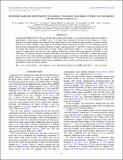Extended baseline photometry of rapidly changing weather patterns on the brown dwarf binary Luhman-16
View/
Date
20/10/2015Author
Funder
Grant ID
ST/J001651/1
257431 257431
ST/M001296/1
Keywords
Metadata
Show full item recordAbstract
Luhman-16 (WISE J1049-5319) was recently discovered to be a nearby (∼2 pc) brown dwarf binary that exhibits a high degree of photometric variability (Δm ∼ 0.1 mag). This is thought to be due to the evolution of "cloud" features on the photosphere, but Luhman-16 has been found to show unusually rapid changes, possibly resulting from fast-evolving "weather." This target is of particular interest because it consists of a co-evolutionary pair of brown dwarfs spanning the transition between L and T spectral types (L7.5 and T0.5), which are expected to be associated with changes in cloud surface coverage. Being comparatively bright (I ∼ 15.5 mag), the target is well suited for observation with the new Las Cumbres Observatory Global Telescope Network (LCOGT) of 1 m telescopes. We present long-time baseline photometric observations from two of LCOGT's southern hemisphere sites, which were used in tandem to monitor Luhman-16 for up to 13.25 hr at a time (more than twice the rotation period), for a total of 41.2 days in the SDSS-i′ and Pan-STARRS-Z filters. We use this data set to characterize the changing rotational modulation, which may be explained by the evolution of cloud features at varying latitudes on the surfaces of the two brown dwarfs.
Citation
Street , R A , Fulton , B J , Scholz , A , Horne , K , Helling , C , Juncher , D , Lee , G & Valenti , S 2015 , ' Extended baseline photometry of rapidly changing weather patterns on the brown dwarf binary Luhman-16 ' , Astrophysical Journal , vol. 812 , no. 2 , pp. 161 . https://doi.org/10.1088/0004-637X/812/2/161
Publication
Astrophysical Journal
Status
Peer reviewed
ISSN
0004-637XType
Journal article
Description
K.H. is supported by a Royal Leverhulme Trust Senior Research Fellowship and by the UK Science and Technology Facilities Council (STFC) grant ST/J001651/1. C.H. and G.L. highlight the financial support of the European Community under the FP7 by the ERC starting grant 257431.Collections
Items in the St Andrews Research Repository are protected by copyright, with all rights reserved, unless otherwise indicated.

